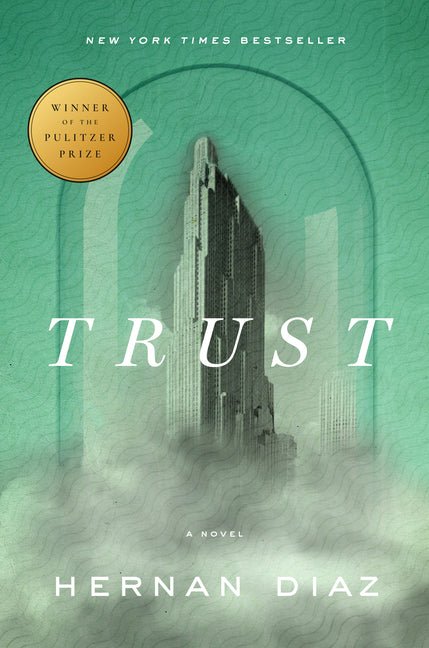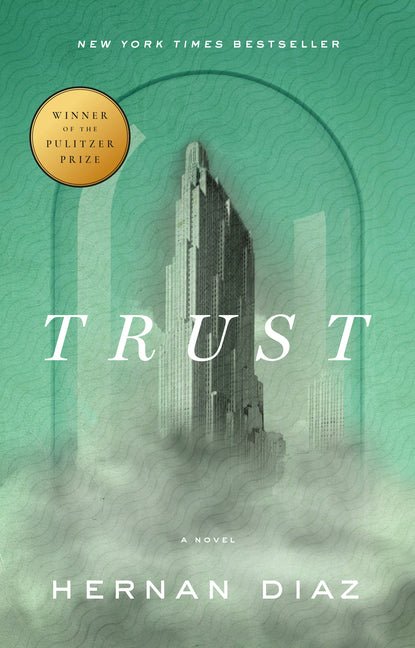Riverhead Books
Trust (Pulitzer Prize Winner)
Couldn't load pickup availability
WINNER OF THE PULITZER PRIZE FOR FICTION
ONE OF THE NEW YORK TIMES'S 100 BEST BOOKS OF THE 21ST CENTURY
A NEW YORK TIMES BESTSELLER
ONE OF BARACK OBAMA'S FAVORITE BOOKS OF 2022
LONGLISTED FOR THE 2022 BOOKER PRIZE
"Buzzy and enthralling . . . A glorious novel about empires and erasures, husbands and wives, staggering fortunes and unspeakable misery . . . Fun as hell to read." --Oprah Daily
"A genre-bending, time-skipping story about New York City's elite in the roaring '20s and Great Depression." --Vanity Fair
"A riveting story of class, capitalism, and greed." --Esquire
"Exhilarating." --New York Times
Even through the roar and effervescence of the 1920s, everyone in New York has heard of Benjamin and Helen Rask. He is a legendary Wall Street tycoon; she is the daughter of eccentric aristocrats. Together, they have risen to the very top of a world of seemingly endless wealth--all as a decade of excess and speculation draws to an end. But at what cost have they acquired their immense fortune? This is the mystery at the center of Bonds, a successful 1937 novel that all of New York seems to have read. Yet there are other versions of this tale of privilege and deceit.
Hernan Diaz's TRUST elegantly puts these competing narratives into conversation with one another--and in tension with the perspective of one woman bent on disentangling fact from fiction. The result is a novel that spans over a century and becomes more exhilarating with each new revelation.
At once an immersive story and a brilliant literary puzzle, TRUST engages the reader in a quest for the truth while confronting the deceptions that often live at the heart of personal relationships, the reality-warping force of capital, and the ease with which power can manipulate facts.
Share
Book Details
ISBN:
9780593420317
EAN:
9780593420317
Binding:
Hardcover
Pages:
416
Authors:
Hernan Diaz
Publisher:
Riverhead Books
Published Date: 2022-03-05
View full details

Well written, researched and plotted novel for its first third.Thereafter, each of its attributes degrades to mediocre.
A must read if you like to keep up with good fiction.
Very interesting - you learn about finance and people. Pulitzer made a good choice
I loved figuring this out as I moved through it. Extremely well written and researched. I very much enjoyed it
During the April matinée, book club members gathered to discuss Trust by Hernan Diaz, the winner of the 2024 Pulitzer Prize for Fiction.What drew the most attention was the novel’s structure. Some oenophiles found the early chapters slow, repetitious, and boring. For me, however, the book truly came alive when the narrative shifted to Ida Partenza’s story. And I found myself entirely captivated once Mildred’s journal began to ramble and resist legibility.In the spirit of Rashomon, Diaz pushes readers into a rabbit hole of ambiguity and encourages them to accept that no single account can capture the full truth. The novel becomes a layered meditation on wealth, division, authorship, power, and the erasure of women and the working class in the official narratives of financial empires. After reading it, the multiplicity of voices lingers, as do the silences surrounding gender, historical truth, moral compromise, and the fading or erasure of the history of immigrant working-class anarchists like Ida's father. His name remained anonymous - a thorough erasure.The novel gains narrative momentum when it turns to the story of Ida Partenza, the young ghostwriter, and her loving father, an aging, anonymous Italian anarchist. Ida’s father embodies a strain of early 20th-century radicalism, evoking real-life revolutionaries such as Errico Malatesta, Luigi Galleani, Carlo Tresca, and Nicola Sacco. His fierce idealism and scorn for compromise sharply contrast with the opulence and cunning of Andrew Bevel’s world—a world of polite robberies cloaked in legitimacy. Readers would not fail to notice the fault line of the ideological divide that Ida must navigate both emotionally and intellectually.Mildred, depicted under the alias Helen Rask (née Helen Brevoort), is rendered with confusion. The only thing we must note is that her private reading list included Transcendentalists like Thoreau, satirists such as Swift, and aphorists like Nietzsche and Karl Kraus—figures who emphasize personal moral clarity over public acclaim. In a world defined by acquisition and spectacle, her alignment with self-esteem and inward freedom marks her both as otherworldly and fatally out of place.Andrew Bevel, the self-styled titan of finance, appears allegedly modeled after Andrew William Mellon - a banker, industrialist, and former U.S. Treasury Secretary. Mellon Bank, a major outlet in transaction processing, provides a plausible historical analogue. Though Diaz offers Andrew a cool indictment of the myth of the financial genius, the story gradually dismantles the machinery that props up Bevel’s legend. It portrays him as both a powerful man and as a curator of his own myth—a myth built on silence, omission, and borrowed insight.The book offers a vivid portrait of the leisure class—their vicarious consumption, conspicuous charity, and their obsessive pursuit of cultural legitimacy. The nouveau riche of the Gilded Age didn’t merely donate books—they built entire libraries. They didn’t attend concerts—they hosted them in their drawing rooms. The creation of the Metropolitan Opera House itself stemmed from exclusion, a riposte to the Academy’s refusal to grant box seats to parvenu, the upstart millionaires, hilariously depicted in the HBO drama series: The Gilded Age.Amidst the backdrop of the Great Depression, while most Americans suffered unimaginable hardship, a few—Jesse Livermore, Floyd Odlum, Joseph Kennedy—turned catastrophe into windfall by shorting the market. These figures serve as silent reminders that Pluto's wealth is rarely innocent. It accumulates not only during booms, but in the wreckage of collapse—when the world burns and opportunists strike.Mildred’s invisible contribution to her husband’s empire is reminiscent of Emily Roebling, who took over the construction of the Brooklyn Bridge after her husband fell ill. Like Roebling, Mildred was the intellectual and strategic force behind the scenes. Yet her influence is effaced, her agency denied. This gendered erasure reflects the broader reality of finance, where women were virtually absent from the upper echelons of investment banking until the 1980s.One can't help but wonder why so many intelligent, beautiful women in literature are doomed to die young. From Millie in Henry James’s The Wings of the Dove to Mildred Bevel in Trust, their deaths feel less like narrative resolution and more like aesthetic sacrifice—tragedies designed to ennoble the male protagonist or deepen the story’s moral tone. While high maternal mortality rates (MMR in short) might offer a partial historical explanation, we must consider other causes such as mental illness, tuberculosis, suicide, and possibly social isolation. We are not far from there.Postscript) The trusts, or investment trusts, in the 19th and early 20th centuries were investment partnerships, essentially like buy-out funds or hedge funds in the post-WWII banking parlance. They were vehicles designed not just to grow capital, but to concent...


